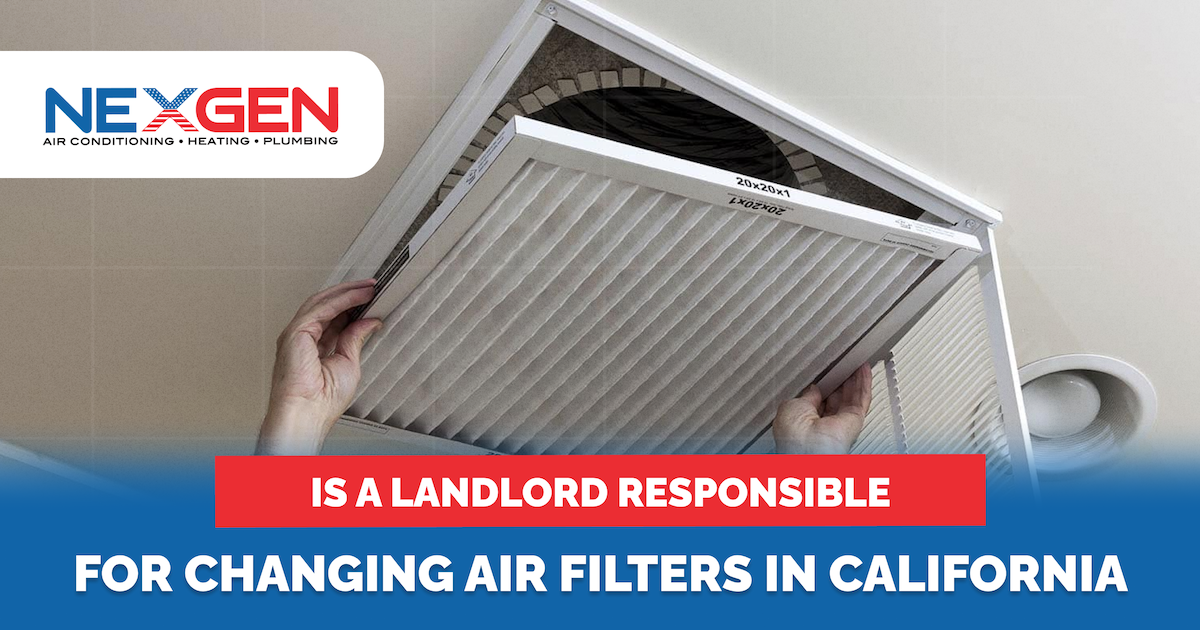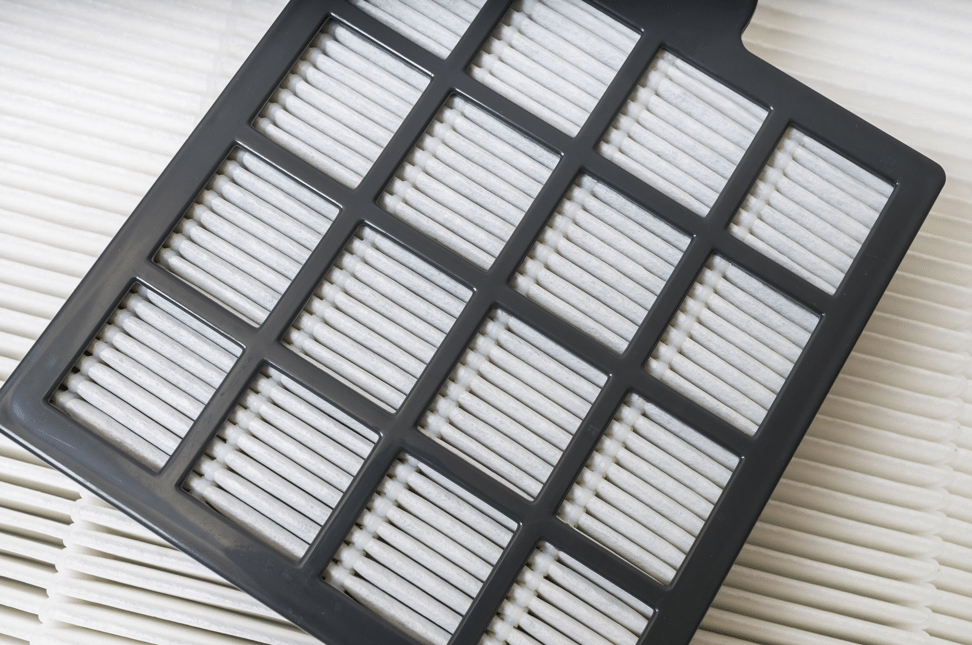Is a Landlord Responsible for Changing Air Filters in California?

Your apartment lease will outline what the tenant is responsible for and what the landlord is responsible to take care of. If the lease requires the tenant to maintain the air filter, you are responsible for changing it. But maintaining a heating and cooling system is often the landlord’s responsibility. The condition of the air filter is one of many things you should check before moving in. But as for the question, “Is a landlord responsible for changing air filters in California every time?” Well, that depends on the lease agreement.
Housing in California is legally required to have functional, properly maintained ventilation and heating systems. The landlord is responsible for any repairs unless the tenant caused damage. Nevertheless, state law requires a rental unit to be “legally habitable” rather than specifically calling for cooling units.
Should a Landlord Change AC Filters?
A landlord can choose whether to require a tenant to replace air filters. If so, it’s a good idea to provide the tenant with information such as the right type and correct-sized filter. When the landlord takes on the responsibility, they’ll need to keep track of when each filter in each unit needs to be changed.
Will My Landlord Maintain My Air Conditioning System?
You can reasonably expect a landlord to handle maintenance if they provided an operable AC system when you moved in. It’s their responsibility to repair or replace an air conditioner if it stops working through no fault of your own. By law, the landlord is required to cover repairs if you call them and make a written statement about the situation, and allow them 14 days to a month to make the repairs.
If your landlord assumes responsibility for changing air filters, failed to do so, and an AC or heating problem occurred as a result, they’re required to fix it. Otherwise, they would violate the implied warranty of habitability. A nonfunctional air conditioner can make a rental unit uninhabitable, which would violate the law.
When you think a repair or maintenance task falls under the landlord’s responsibility, keep copies of all transactions and receipts. Get everything in writing as well. A “repair and deduct” remedy allows you to deduct money from the rent to pay for repairs that cost more than a month’s rent (filters generally cost much less than that). But a landlord would most likely want to make sure filters are in working order to prevent such a circumstance.
There is also an “abandonment” remedy that permits you to move out of a defective rental unit and a “rent withholding” remedy. If the landlord refuses to fix serious defects, you could withhold rent, deduct an amount, or abandon the unit. However, this applies only after providing proof of such defects and informing the landlord of your intent in writing.
NexGen Provides High-Efficiency ACs and Air Filters
Putting aside the question, “Is a landlord responsible for changing air filters in California?”, you can trust NexGen for high-quality, high-efficiency solutions. We can provide upgraded air filters to improve indoor air quality and air conditioner maintenance to ensure your AC performs well. Whether you need routine service or 24/7 emergency repairs, call 833-729-9735 for prompt service.
Can HEPA filters Stop Allergies?

Flowers are blooming, the grass is green and lush, and trees are bursting with new leaves… Don’t you just love this time of year?
Not so much if you have allergies.
When the pollen count is out of control, all you want to do is hide in an air-conditioned room until fall. Unfortunately, that probably won’t help.
You might think your air conditioning system will filter out all those nasty allergens from the air, but without the right air filters for allergies, you’ll still be sniffling and sneezing your way through the season.
And it’s not just pollen you need to worry about! The summer heat and humidity make the conditions ripe for the growth of mold and mildew, which can also bring on allergy symptoms.
Learn the facts about choosing the right air filters for allergies, as well as other HVAC maintenance tips that can reduce your suffering this season.
Fact #1 About Air Filters for Allergies:
Regular HVAC filters are intended to protect the equipment, not your lungs and sinuses.
Many people mistakenly believe that the air filters in furnaces and air conditioners keep dust and allergens out of the air.
That’s not what HVAC filters are designed to do. Their purpose is to keep dust out of the equipment to prevent damage to the system and keep it running efficiently.
While ordinary furnace and ac filters do help to remove some dust from the air (when changed regularly!), they do little to trap the microscopic particles that cause the sneezing and wheezing of allergy season.
That’s why you need special air filters for allergies that are designed to stop those tiny particles.
Fact #2 About Air Filters for Allergies:
Ordinary paper filters can’t trap allergens.
Those paper filters ordinarily used in your furnace and air conditioner are designed to trap large particles like dust that can accumulate on the motor and fans and reduce efficiency. However, particles like mold, bacteria, and certain types of pollen are much smaller in size, so they slip right through the fibers of those regular filters.
That means they get circulated through your ductwork and blown back into your space.
Air filters for allergies are designed to block much smaller particles, so your air stays cleaner. They are called “high energy particulate air filters” or more commonly, HEPA filters.
Because HEPA filters are made from densely packed layers of glass fibers instead of paper, the best ones can trap more than 99 percent of pollen, dust and smoke particles and keep them out of the air you breathe every day.
Fact #3 About Air Filters for Allergies:
All HEPA filters are not created equal.
Unfortunately, it’s not good enough just to look for a HEPA filter for your air conditioner. To get the best results, you need to check the MERV ratings.
HVAC HEPA air filters for allergies are rated on how well they block particles of different sizes. The rating system is called the minimum efficiency reporting system, or MERV. The ratings range from MERV 1 to MERV 12, with the higher number indicating filters that can remove the smallest particles, including many species of pollen.
Your HVAC service professional can help you get and install the best MERV-rated filter for your air conditioning and heating systems. Ideally you want to choose a MERV rating of 10 or higher, which are most effective at blocking the particles that cause allergy symptoms.
Fact #4 About Air Filters for Allergies:
You need to change those filters more frequently than you think.
HEPA air filters for allergies need to be changed more frequently than ordinary paper HVAC filters, especially during high pollen season.
That means changing them at least every other month, and possibly more often depending on your location. An HVAC service expert can advise you on what’s recommended for your equipment and your area.
Fact #5 About Air Filters for Allergies:
The right filter is only half the story.
Using the right air filters for allergies does help to reduce the allergens in the air, but don’t forget about cleaning it from the rest of your HVAC system. If you haven’t had your air conditioning system maintained at least once every year, you’ve likely got quite a bit of buildup on the blower fans and in your ductwork.
Did you know that the air you breathe cycles through your HVAC system about 5 to 7 times each day? If you have not been using the right HEPA air filters for allergies AND not maintaining your air conditioning system, years’ worth of dust, pollen and even mold spores are sitting in on your equipment and in your ducts right now.
Check out our list of 31 HVAC tips to learn about even more air quality and AC tips for your home!
Call NexGen HVAC & Plumbing
Our expertise and commitment to customer satisfaction make us the leading HVAC company in Southern California. To learn more about our equipment, services, and protection plan, book an appointment online or call 888-277-0415.










